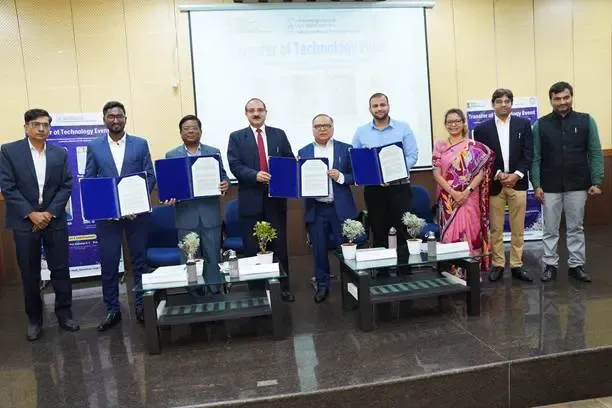UIDAI CEO: Indigenous Conductive Ink Production Technology to Decrease Import Reliance

New Delhi, Jan 11 (NationPress) The large-scale production of silver nanowires and conductive ink within the nation has the potential to significantly diminish India's reliance on imports for advanced electronic material applications, as stated by Bhuvnesh Kumar, the CEO of the Unique Identification Authority of India (UIDAI).
Kumar emphasized the transformative capabilities of local nanosilver-based conductive ink technology in the semiconductor ecosystem, which can be utilized in various applications including flexible electronics, electronic packaging, displays, solar photovoltaics, and RFID tags.
During an event at NIT Warangal, the indigenous expertise in silver nanowire-based conductive ink technology was successfully handed over to two startups — Chematico Technologies Private Limited (incubated at IIT Ropar) and Vasanthbala Functional Materials Pvt Ltd (incubated at NIT Warangal).
This technology transfer was part of a project funded by the Ministry of Electronics and Information Technology (MeitY) and was collaboratively executed by Professor Sarang Gumfekar from IIT Ropar and Professor Shirish Sonawane from NIT Warangal.
While commending the startups, Kumar advocated for the mass production of silver nanowires and the manufacturing of conductive ink domestically.
He noted that the developed technology could lessen India's dependency on imports for advanced electronic material applications.
The global market for silver nanowire-based conductive ink and adhesives is anticipated to exceed $16.87 billion by 2032, driven by a rapid increase in the sectors of electronics, semiconductors, solar photovoltaics, and RFID technology.
This market growth can be attributed to substantial demand from end-user industries.
Currently, India imports conductive ink worth approximately $15,72,000 annually, with the US, China, Netherlands, UK, and Taiwan being the primary exporting countries.
Silver nanowire-based conductive ink is widely used for the repair and enhancement of circuits on printed circuit boards.
This ink is also essential in flexible electronics (such as foldable devices/screens, computer keyboards, and windscreen defrosters), RFID tags, wearable devices, sensors, display technologies, and solar panels.









